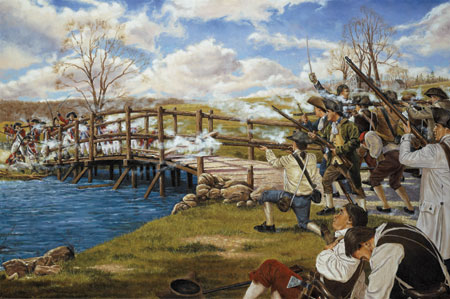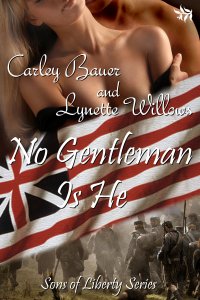When my co-author, Carley Bauer, convinced me to co-write a romance novel based in the American Revolutionary War, I had long accepted the information taught to me in school as fact. However, in the process of researching for this book, for we wanted this to be an intelligent novel for intelligent readers, I found out that not everything we learned was entirely factual.
The most surprising thing we found out was that Longfellow’s poem about Revere’s “Midnight Ride” was, to a great extent, fiction. Not surprising, since it was written more than hundred years later.
It can be excused, since Longfellow is in fact Revere’s distant cousin, and he probably wanted to heighten the notoriety of his famous ancestor. However, since I love historical surprises, let me enlighten those who are still unaware of the actual facts, and why that conversation took place in our book, during the famous first battle to regain control in Concord.
First of all, there was never supposed to be a battle in Lexington or Concord. The militia and minutemen only wanted to protect their leaders from being arrested for treason, which was a crime punishable by death. It was also essential they protect the arms and ammunition that the colonialists had been stockpiling for several years. To lose those would mean they were beaten in their argument with the Crown before they even started, and they would forever be silent in the affairs of their nation.
First myth was that Revere rode on his quick-footed steed to shout out to everyone, “The British are coming!” First thing you have to remember is, everyone still considered themselves British, or English, at that time. They were still a proud part of the Commonwealth and honestly had no wish to break from the Crown, though some minor players wanted separation. Most just wanted appeasement, and applied for it through the “Olive Branch” series of letters to England. So, it now seems unlikely that Revere would have used that term. What Revere probably shouted was in fact, “The regulars are advancing,” or “The regulars are coming out”.
Second myth is that Revere actually arrived in Lexington or Concord. He did manage to warn Adams and Hancock at the home where they were staying, the two men on his route who were targeted for arrest. However, he wasn’t alone. He was joined by William Dawes, although by different routes and they eventually met up. In fact, there was a league of men, all scattered about the countryside, raising the alarm. They all rode hard, although it was not on fast steeds.
In fact, Revere himself plodded along on his thick footed, oversized farm plough horse, and Dawes actually had to slow down frequently to allow Revere’s horse to catch up. They eventually ran across some British soldiers, and while Dawes and Samuel Prescott, another man who joined them on the road, got away, though Dawes limped all the way down the roads, then became lost in the dark because he lost his horse in the scuffle, and Prescott, the only one to retain his horse, made it quickly to Concord to warn of the impending arrival of the soldiers, Revere actually fell off his horse. Winded, he was unable to run away and the British soldiers arrested him and kept him with them until about 3 am, when he finally convinced the soldiers that many more opposition men were gathered than what there actually were. Revere’s horse had disappeared. Alarmed, the soldiers released Revere and took off to join their comrades at Lexington. Revere sprinted on foot all the way to Lexington as well, to arrive to see the end part of the battle on Lexington Green. Exhausted, he bravely took hold of a rifle and joined in the fray.
It’s ironic that only one of the three men actually succeeded in their mission to warn the colonialists of the arrival of British troops in Concord, and of all three, Dr. Samuel Prescott is the least known of them all. There is not even a portrait of him.
Paul Revere will forever be remembered because of “The Midnight Ride”, and perhaps he was chosen because he was the most charismatic of the men that fateful night. He was also highly respected as a patriot, and always willing to put himself at risk for what he believed in. He was by no means a coward; quite the opposite in fact, so even though the poem may be inaccurate in many ways, Revere still deserves a great place in American history. He was perhaps the best silversmith of that era, and if his stuff is collectable and valuable, it is well earned.
As for Samuel Prescott? He is unfortunately largely forgotten now, and it’s a shame considering he managed to accomplish what the others did not, and probably was responsible for saving Concord in the grand scheme of things. He served as a surgeon to the Continental Army, still braving the front lines during battles, but later died in a British prison sometime late in 1776.
“Listen my children, and you shall hear,
Of the midnight ride of…Samuel Prescott?”
Order at: Amazon @ http://www.amazon.com/No-Gentleman-Sons-Liberty-ebook/dp/B00BPY7UJO
Smashwords @ http://www.smashwords.com/books/view/292998
Eros E-Books @ http://www.ebook-eros.com/item/SW00000292998/Bauer-Carley-No-Gentleman-Is-He/1.html
Tirgearr Publishing @ http://www.tirgearrpublishing.com/authors/Bauer_Carley/no-gentleman-is-he.html



No comments:
Post a Comment